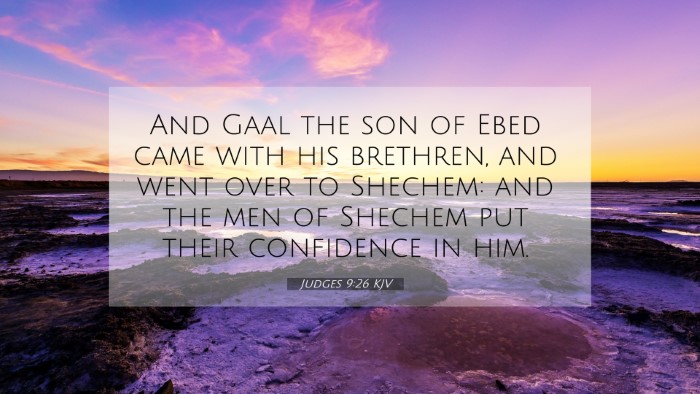Understanding Judges 9:26
Judges 9:26 states:
“And Gaal the son of Ebed came with his brethren, and went over to Shechem; and the men of Shechem put their confidence in him.”
This verse is pivotal in the narrative of the Book of Judges, particularly in the context of Israel's turbulent leadership and the rise of various factions among the Israelites after the death of Gideon. To comprehend its significance, we can draw insights from several public domain commentaries.
Commentary Insights
Matthew Henry's Commentary
Matthew Henry highlights the rise of Gaal as a figure of rebellion against Abimelech, demonstrating how divisions arose within Israel. He notes that the trust the men of Shechem placed in Gaal reflects the perpetual cycle of Israel turning to new leaders, often leading to conflict and bloodshed. This trust, Henry explains, shows how quickly people's loyalties can shift, especially in times of instability.
Albert Barnes' Notes
Albert Barnes provides a contextual analysis of Gaal's entrance into Shechem. He emphasizes the historical and political backdrop, noting that after Gideon's death, various tribes began vying for leadership. Barnes discusses the implications of Gaal's rebellion, viewing it as a reflection of Israel's unfaithfulness and the quest for a leader who aligns with their momentary desires rather than God's will.
Adam Clarke's Commentary
Adam Clarke delves into the characters involved, presenting Gaal as ambitious and possibly misguided. Clarke suggests that Shechem's choice to support Gaal is indicative of their discontent with Abimelech's rule, highlighting the lack of unity in Israel during this time. He further stresses that this act of rebellion foreshadows chaos, as the people's choice leads them deeper into conflict.
Bible Verse Cross-References
Judges 9:26 connects with several other scripture passages that illuminate its themes of leadership, division, and rebellion:
- Judges 8:33-34 - Shows the pattern of Israel turning from God after Gideon's death.
- Judges 10:6 - Details the recurrent cycle of Israel's sin and the consequences of rejective leadership.
- 2 Samuel 20:1 - Discusses another uprising and the complexities of leadership in Israel.
- Psalms 78:67-68 - Highlights God's choice of leaders, contrasting them with Israel’s inclination to follow their own desires.
- 1 Samuel 8:4-5 - Reflects Israel's desire for a king and the repeated nature of seeking earthly leaders over God's appointments.
- Isaiah 3:1-5 - Prophecies regarding leadership failures and societal upheaval in Israel.
- Matthew 23:37-38 - Jesus laments over Jerusalem’s rejection of God-given leadership, echoing historical patterns of rebellion.
Thematic Connections
The themes explored in Judges 9:26 are found throughout the Scriptures, signifying the instability of human leadership and the consequences of straying from divine guidance. The inter-Biblical dialogue emphasizes that:
- Divine leadership is crucial, as shown in 1 Samuel 12:12 when Israel demanded a king despite God's warnings.
- Rebellion often leads to division, seen in Matthew 12:25, where a kingdom divided against itself cannot stand.
- Trusting in man rather than God can lead to disaster, as illustrated in Psalms 118:8-9, which declares the importance of putting trust in the Lord.
Cross-Referencing Biblical Texts
This passage serves as an example of the importance of cross-references when studying the Bible. For those new to biblical study, here are practical tools to engage with cross-references:
- Bible Concordance: A vital resource for finding related verses.
- Bible Cross-Reference Guide: Allows parallel study of themes and events across scriptures.
- Bible Chain References: Help in linking similar stories or teachings.
Comparative Bible Verse Analysis
When analyzing Judges 9:26 comparatively, one can note the implications of disobedience and searching for suitable leadership. The scriptural parallels can exemplify the consequences that come from a lack of faithfulness:
- Identifying the connections between Old and New Testaments enhances understanding, as seen in passages like Hebrews 13:17, advising obedience to spiritual leadership.
- The Gospels provide similar themes of rejection and trust, especially in John 10:12-13, where a good shepherd contrasts hired hands.
Conclusion
Judges 9:26 not only narrates a historical event but also lays the foundation for examining the broader themes of leadership, rebellion, and God’s sovereignty. By engaging with cross-references and exploring thematic connections, one gains deeper insights into scripture and the ongoing relevance of these narratives in understanding God's plan throughout the Bible.




